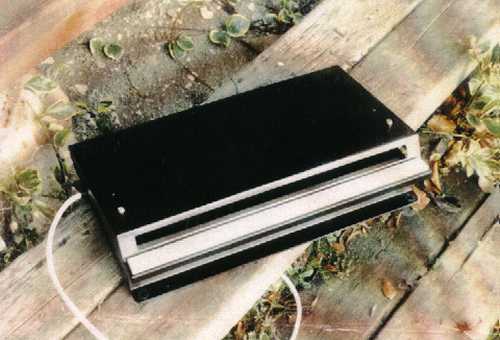| Behind Closed Doors Everybody at some time or other must have wondered what really goes on behind certain closed doors -No.10 say, or Room Five Hundred and Four- but there is no reason for anyone to assume any out-of-the-ordinary activity within, as they pass the door of the lane-side cottage. Higher Chalkway, on the outskirts of Winsham.........or is there? Quietly and unobtrusively in the womb of a miniscule shelf-and-tool lined back bedroom, hundreds of small industrial machines have, in each of the last twelve or so years, been brought into the world to join their brother and sister machines already in use and providing employment for well over 5,000 Operators both in this country and abroad. The Polysealer -for that is its name- was invented by Humphrey Daniels in 1956, and up to his retirement to the village here in 1986 he was a Director of a B.P.Chemicals subsidiary, when the Polysealer was manufactured under licence. Immediately after his arrival, however, he took over production himself as a  retirement interest and so, from this time on, all machines were exclusively 'home grown'. retirement interest and so, from this time on, all machines were exclusively 'home grown'.Yes, but what is it? What does it do? About the size of a small portable typewriter, it is an electrically powered hand operated single action Heat Sealing Machine for closing (by heat welding) filled polythene bags. Initially, and for many years, the Polysealer had a very broad user base. The London County Council, for example, bought several to seal thousands of polythene bags containing archive material and deeds of historic buildings to prevent serious damage should the Thames overflow, as was (then) a real possibility. Hospitals, laboratories and factories took them as well as schools and universities. And publishers too,indeed our own Roy and Janet Smart had purchased one, long before Humphrey had ever heard of Winsham! Its virtues were also discovered by the British Sheep Dairying Association who recommended it widely to farmers -many of whom were in the West Country- for polythene bag packaging their sheep milk as deep frozen slabs prior to cheese making. But there was one Industry above all others where the Polysealer found a special niche. It was adopted almost universally by Britain's Direct Mailing Companies, many of whom had banks of forty or more machines working flat out eight hours a day. With each one capable of sealing up to 900 packs an hour, every factory could post off well over one and a half million units a week. Although The Polysealer Company had aimed to close with the Century's end some customers have insisted on further supplies and so another 50 have just been made - this time for a chain of Jewellery shops. It is so difficult to say 'no', but 43 years is long enough! Over this time the machine has received countless plaudits and has proved an indispensable tool in the day-to-day functioning of hundreds of Organisations both private and public. Although to compare its overall contribution to society against say the Computer or the Mobile 'phone might be just a bit over the top, it is fair to say that at some time or other every household in the land will have received, and possibly been influenced by, a catalogue or magazine or special promotion, packaged exclusively by the Polysealer, - the little machine that's.......... 'Made in Winsham'. |